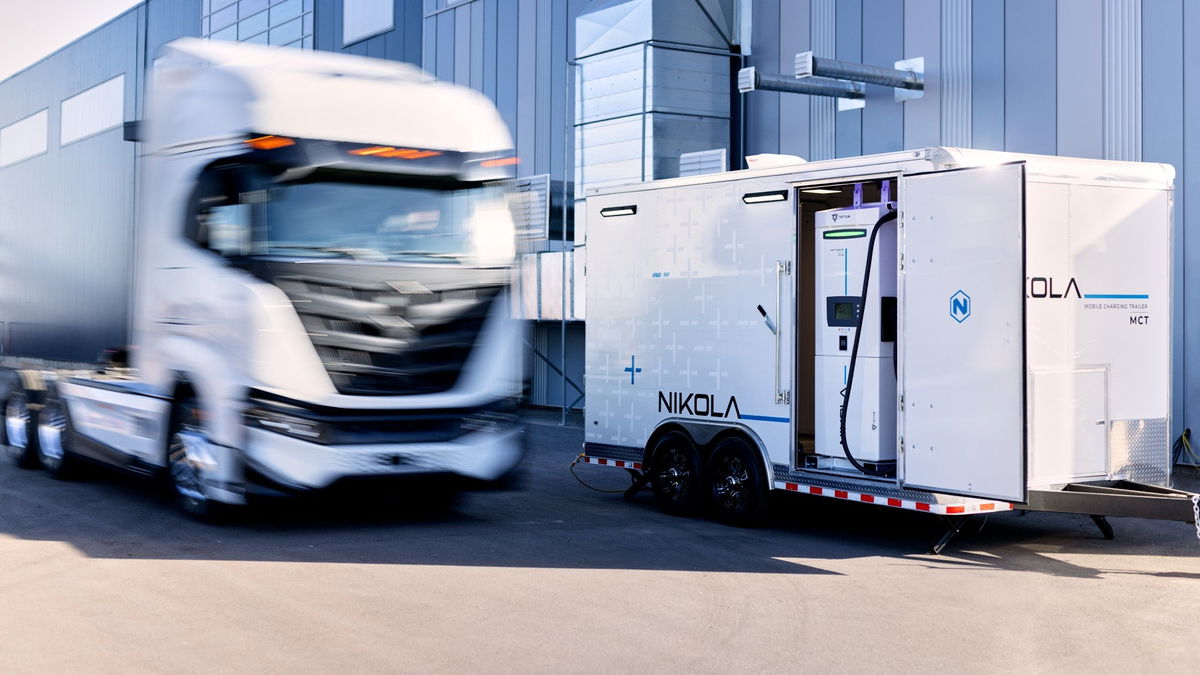Nikola Corp. posted its first-ever gross profit in Q1, a milestone for the electric truck maker that also recorded 134 heavily incentivized orders from fleets planning to operate in California.
The startup electric truck maker began regular production of its battery-electric Class 8 Tre BEV cabover on March 21. Nikola shipped 11 trucks at the end of April to dealers to fulfill customer orders.
Forty preproduction trucks built in Q1 are being used by dealers as demonstration units. Univar Solutions concluded a 14-day trial and ordered six Tre BEVs. A pilot with Covenant Transport continues. Other demos will follow, CEO Mark Russell said on a call with analysts Thursday.
For Q2, Nikola expects to deliver 50-60 trucks generating $15 million to $18 million in revenue.
The first phase of Nikola’s Coolidge, Arizona, plant is complete. Capacity is 2,500 trucks, though Nikola plans just 300 to 500 trucks this year. A second phase in 2023 will allow production of 20,000 trucks on two shifts annually.
Nikola production risk from battery pack availability
Battery pack availability could restrict that to the lower end of the estimate. “We make sure we’re working closer with our supplier when it comes to manufacturing and yield,” Chief Financial Officer Kim Brady said on the call.
Nikola also considers microprocessing chips at risk, consistent with other manufacturers.
All other key electric components for 500 trucks are secure. Parts delivery is 80% weighted to the second half of the year, when Nikola will increase from one to five builds a day.
“We continue to have full supplier commitment and are confident in our ability to achieve our full-year target range without making revisions,” Brady said.

Electric truck maker still losing money
Nikola (NASDAQ: NKLA) is still losing money. It won’t post meaningful revenue until Q2. But it eked out a $431,000 gross profit in Q1 from leases for 10 mobile charging stations.
Phoenix-based Nikola lost $79.15 million, or 37 cents a share, before interest, taxes, depreciation and amortization in Q1. That compares to an EBITDA loss of $53.43 million, or 31 cents, in the same quarter a year ago.
The company had total liquidity of $794 million at the end of March. Of that, $385 million was cash and equivalents and $409 million was untapped from two equity lines of credit with Tumim Stone Capital. Nikola expects to use all of the cash-for-equity available by the end of the year,
Nikola beat analysts’ top- and bottom-line estimates for the quarter, according to investor site Seeking Alpha. Shares traded up 20 cents at $7.40 intraday Thursday.
Nikola has full order backlog
Nikola has orders, memorandums of understanding and letters of intent for 510 trucks, more than it plans to produce. Of those, 134 are subsidized by vouchers from the California Hybrid and Zero-Emission Truck and Bus Voucher Incentive Project (HVIP). The program uses money collected from pollution fines to cut $120,000 to $150,000 off the price of an electric truck.
In Nikola’s case, that can mean up to half the $300,000 purchase price, though the trucks are selling for more. Total Transportation Services (TTSI) received 10 HVIP vouchers that were converted into purchase orders with Nikola dealers. TTSI accumulated more than 11,000 miles in and around the ports of Los Angeles and Long Beach, California, reporting 93% uptime.

“Any Class 8 uptime is critical,” Russell said. “These are machines that our customers base their business on. If they don’t operate, they don’t make money. We are very pleased with the pilots we’ve run thus far with TTSI and others.
“The demand is pretty seismic. If you can get somebody a zero-emissions truck that is reliable and capable, then everybody wants one. Then it becomes a discussion about the terms.”
HVIP closed the portion of its voucher program that offered $150,000 per truck for those located in a so-called disadvantaged community near the ports. Sixty Nikola dedicated drayage orders from seven customers received the highest-value vouchers through April.
Fuel cell testing
Pilot testing with Anheuser-Busch of alpha versions of the hydrogen fuel cell-powered Tre concluded in April. Nikola expects to build 19 beta versions of the fuel cell by the end of the year. TTSI, which intends to acquire a mix of 100 battery and fuel cell Tres, will test the beta version.
Beta fleet validation will run through the first half of 2023. Regular production is planned in the second half.
Nikola will work with TravelCenters of America (NASDAQ: TA) to jointly build its first hydrogen refueling station at an existing TA property in Ontario, California, along Interstate 10. The station will get hydrogen from Nikola’s first hub, an electrolyzer using cheap solar energy from the Arizona Power Service.
Trevor Milton hangover
Nikola spent $14.1 million in the quarter to defend Trevor Milton, the company founder and former executive chairman, who resigned in September 2020. Milton faces trial in July in New York on three federal fraud charges alleging he misled investors about the company’s technical prowess and accomplishments.
Future legal fees are difficult to predict, so they are not forecast, Brady said.
Related articles:
Nikola launches regular production of Class 8 battery-electric trucks
Milton trial date reset for July as Nikola founder drops venue appeal

